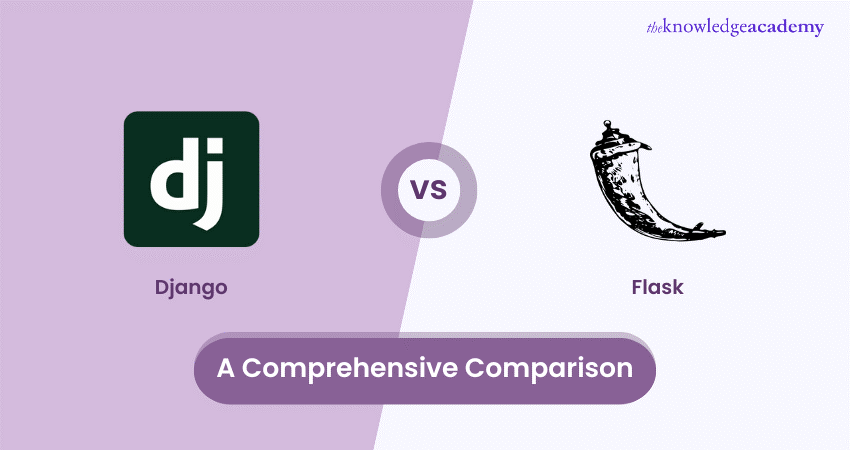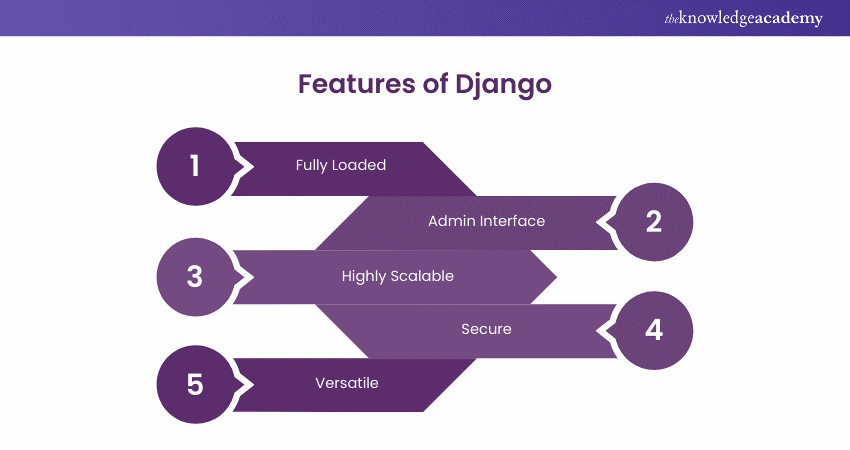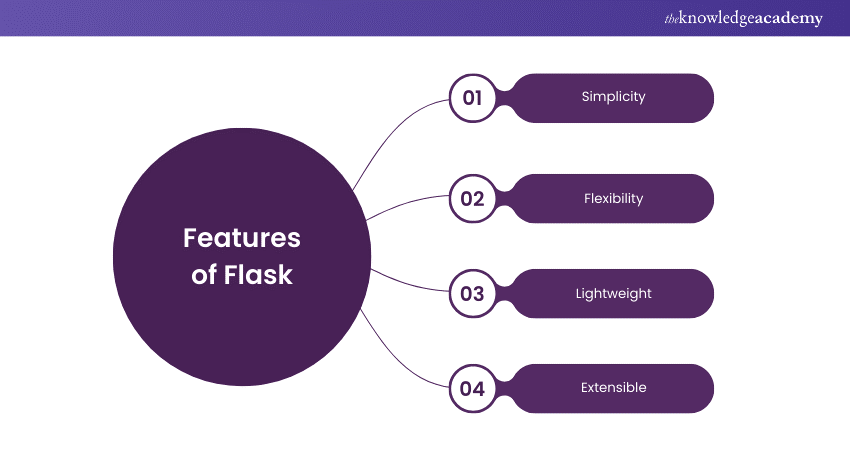We may not have the course you’re looking for. If you enquire or give us a call on +44 1344 203 999 and speak to our training experts, we may still be able to help with your training requirements.
We ensure quality, budget-alignment, and timely delivery by our expert instructors.

When it comes to Web Development, picking the right framework is key, especially with how quickly things change. Django and Flask are two of the top Python frameworks out there, but they’re quite different. Django is great for its comprehensive features and is perfect for developers who need a solid foundation for large-scale projects. Flask, however, is all about simplicity and flexibility, ideal for those who prefer a more hands-on approach from the ground up. To help you out from this dilemma, we have drawn a detailed comparison between Django vs Flask.
Table of Contents
1) What is Django?
2) What is Flask?
3) Flask vs Django: What’s the difference?
a) Cost-effectiveness
b) Security
c) User-friendly
d) Time required for development
e) Speed and efficiency
f) Capacity for growth
g) Job prospects
h) Support from the community
I) Advantages of Django vs Flask
j) Disadvantages of Django vs Flask
4) Conclusion
What is Django?
Django is a very useful and effective Web Application framework written in Python that develops new Web Applications quickly and easily. It’s roughly in line with the “batteries-included” approach that provides a generous set of features out of the box, including an ORM, authentication, and an admin app. Django emphasises simplicity and practicality as an interactive application development framework that allows developers to write their applications without having to start over by developing their components.
It is applicable in large web-based projects requiring high levels of flexibility and stability, which are usually associated with managing large amounts of data. Since Django is heavily based on the reuse of components and since it is supported by extensive documentation and a vibrant community of developers, this framework is rather popular among Web Developers.
Features of Django
Now that you know the kind of framework Django is let us understand its features and what makes it so good. Here is a list of features it has to offer:

1) Fully loaded: Like a do-it-all gadget from a spy movie, Django includes built-in features for almost everything a developer might need.
2) Admin interface: Automatically generated interface, that is admin ready.
3) Highly scalable: Like the different settings of a luxury automatic car, Django is adaptable to high-traffic demand.
4) Secure: Designed to help developers create secure websites automatically without the hassle of requiring external security.
5) Versatile: It can build almost anything from content management to scientific computing platforms.
Attain in-depth knowledge of the Python framework for creating websites. Sign up for our Python Django Training.
What is Flask?
Flask is a more sophisticated platform containing only the bones for building web applications with no imposed architecture or requirements. Its advantage is that it can be installed where needed, adding only the necessary components, such as the database or form validation. That makes it suitable for smaller applications and applications that require a lot of customisation.
One reason Flask was created with such a simple core and uncomplicated design is that it is very easy to prototype quickly and scale in an equally efficient manner. Flask is preferred by developers who like an uncluttered, straightforward approach to web applications.
Features of Flask
It may not have a database abstraction layer; it, however, does have features to offer you. Here are some of the features provided by Flask:

1) Simplicity: It is incredibly easy to use and learn, which is great if you wish to learn the basics.
2) Flexibility: Flask is a very flexible micro framework. It allows developers to use the right tools for their projects.
3) Lightweight: It is minimalistic and easy to configure according to developer needs.
4) Extensible: It is easily extendable, with numerous extensions to add features as needed.
Unlock your Web Development potential with our Flask Web Development Training With Python – join now!
Flask vs Django: What’s the difference?
You might have already understood some of the differences between Flask vs Django, but what's the fun in battle if the two sides don't put all their troops at play? Here are some further comparisons of the two for a deeper understanding:
Cost-effectiveness
Flask might be more cost-effective for smaller projects or when starting a new project from scratch with minimal requirements, while initially more resource intensive.
On the other hand, Django could reduce costs in the long run due to its built-in features, which reduce development time and effort.
Security
Django boasts a more secure approach that is out of the box and has built-in protection against many vulnerabilities, such as SQL injection, cross-site scripting, and more, which makes it ideal for projects that prioritise security.
On the contrary, Flask provides basic protection but relies more heavily on the Developer to manually plug in additional security measures.
User-friendly
Django’s administrative interface is notably user-friendly for developers. It allows for rapid site management configuration and handling of various site models.
On the other hand, Flask requires more setup and configuration, which can be challenging for newcomers. But it also provides them with good learning opportunities.
Time Required for Development
Django’s "batteries-included" approach speeds up development, as it has more built-in solutions.
On the other hand, Flask might take longer as Developers need to add more plugins and tools, although it can be quicker for tiny, simple projects.
Speed and Efficiency
Flask typically offers better performance with smaller applications due to its lightweight nature.
On the other hand, Django’s structure can cause some latency as applications scale up, though it's highly efficient for managing high loads and complex data operations.
Capacity for Growth
Django is generally better suited for larger applications or projects expecting to scale due to its robust structure and feature-rich framework.
On the other hand, Flask works best with smaller-scale applications, although it can be scaled with careful planning and additional tools.
Try our Python With Machine Learning Training and begin your Data Science journey!
Job Prospects
Django and Flask offer distinct career opportunities. Django is ideal for large-scale projects in big companies, offering strong job prospects for developers. Flask suits startups and small projects, providing flexibility and quick development. Both frameworks open doors to various career paths, depending on your goals and project types.
Support from the community
Django benefits from a larger community, which translates to more third-party plugins, extensions, and educational materials. Flask also has a solid community, though it is smaller and sometimes less active than Django’s.
Advantages of Django vs Flask
|
Aspect |
Django |
Flask |
|
Feature Set |
Comprehensive and built-in |
Minimalist and extendable |
|
Development Speed |
Faster for complex projects |
Faster for small to medium projects |
|
Scalability |
Highly scalable for large applications |
Scalable with additional components |
|
Customisation |
Less flexible due to predefined structure |
Highly flexible and customisable |
|
Community Support |
Extensive and active community |
Strong but smaller community |
|
Learning Curve |
Steeper due to numerous built-in features |
Gentler, easy to grasp for beginners |
|
Use Case |
Best for large, data-driven websites |
Ideal for prototypes and smaller apps |
|
Documentation |
Comprehensive and detailed |
Clear and concise |
Disadvantages of Django vs Flask
|
Aspect |
Django |
Flask |
|
Complexity |
Can be overkill for simple projects |
Requires additional setup for larger projects |
|
Flexibility |
Less flexible due to its built-in features |
More work to integrate third-party libraries |
|
Learning Curve |
Steeper for beginners |
Limited guidance compared to Django |
|
Performance |
Heavier, potentially slower for small apps |
May lack performance optimisation for large apps |
|
Customisation |
Harder to deviate from its conventions |
More manual setup and configuration needed |
|
Resource Usage |
Higher resource consumption |
Efficient, but can become complex to manage |
|
Community Size |
Larger, but more rigid support |
Smaller, with less comprehensive support |
|
Development Speed |
Slower for simple apps due to setup overhead |
Initial setup can be quicker, but scaling can slow down |
Conclusion
Whether you choose Django or Flask, your decision should align with your project's needs and your team's expertise. This exploration of Django vs Flask is more than just a comparison; it's a roadmap to understanding which framework can best bring your project to life. From their fundamental philosophies to practical applications, both frameworks offer unique advantages that can power your next web venture.
Dissect Python’s intricacies with our comprehensive Python Course - sign up today!
Frequently Asked Questions

Flask is most often recommended for beginners due to its simplicity and ease of entry. However, Django’s extensive documentation and robust community also make it a good choice for those new to Web Development.

Yes, it’s possible to switch from Flask to Django as your project scales, though it might require significant changes.

The Knowledge Academy takes global learning to new heights, offering over 30,000 online courses across 490+ locations in 220 countries. This expansive reach ensures accessibility and convenience for learners worldwide.
Alongside our diverse Online Course Catalogue, encompassing 17 major categories, we go the extra mile by providing a plethora of free educational Online Resources like News updates, Blogs, videos, webinars, and interview questions. Tailoring learning experiences further, professionals can maximise value with customisable Course Bundles of TKA.

The Knowledge Academy’s Knowledge Pass, a prepaid voucher, adds another layer of flexibility, allowing course bookings over a 12-month period. Join us on a journey where education knows no bounds.

The Knowledge Academy offers various Programming Courses, including Python Training, PHP Course and Ruby Programming Course. These courses cater to different skill levels, providing comprehensive insights into How to Start Python Threading.
Our Programming and DevOps Blogs cover a range of topics related to Django, offering valuable resources, best practices, and industry insights. Whether you are a beginner or looking to advance your Programming skills, The Knowledge Academy's diverse courses and informative blogs have you covered.
Upcoming Programming & DevOps Resources Batches & Dates
Date
 Python Django Training
Python Django Training
Thu 27th Feb 2025
Thu 10th Apr 2025
Thu 26th Jun 2025
Thu 28th Aug 2025
Thu 23rd Oct 2025
Thu 4th Dec 2025







 Top Rated Course
Top Rated Course



 If you wish to make any changes to your course, please
If you wish to make any changes to your course, please


